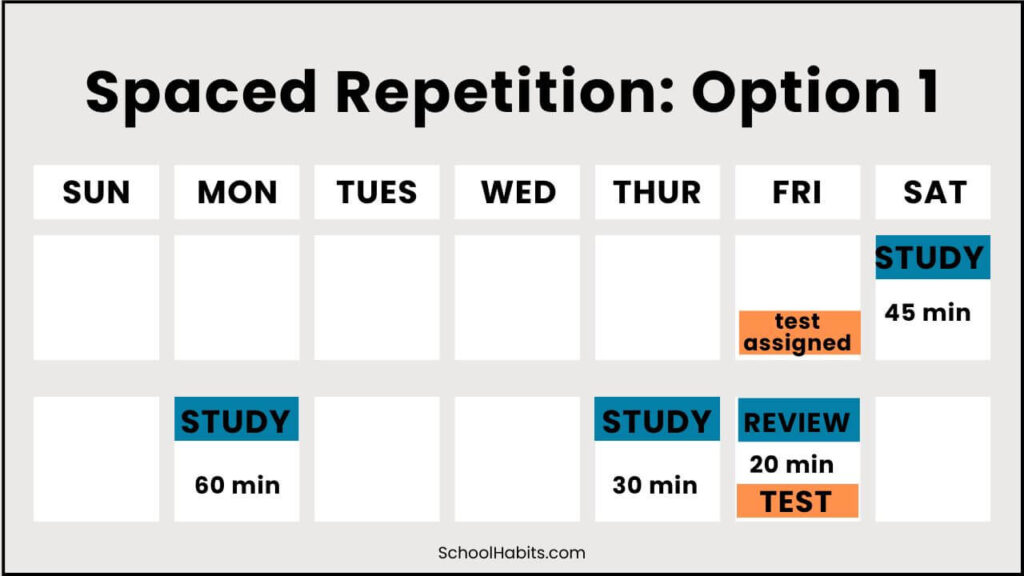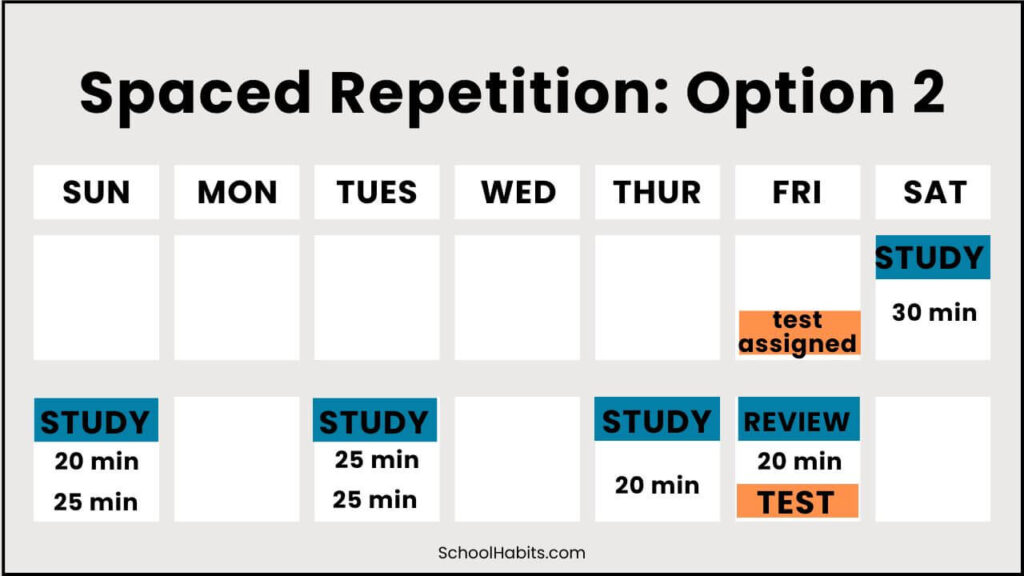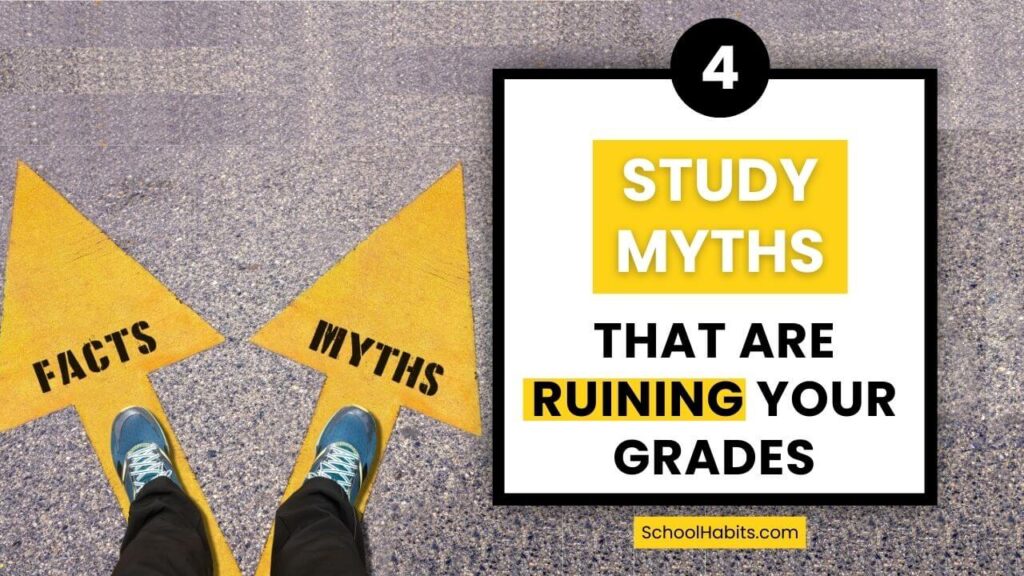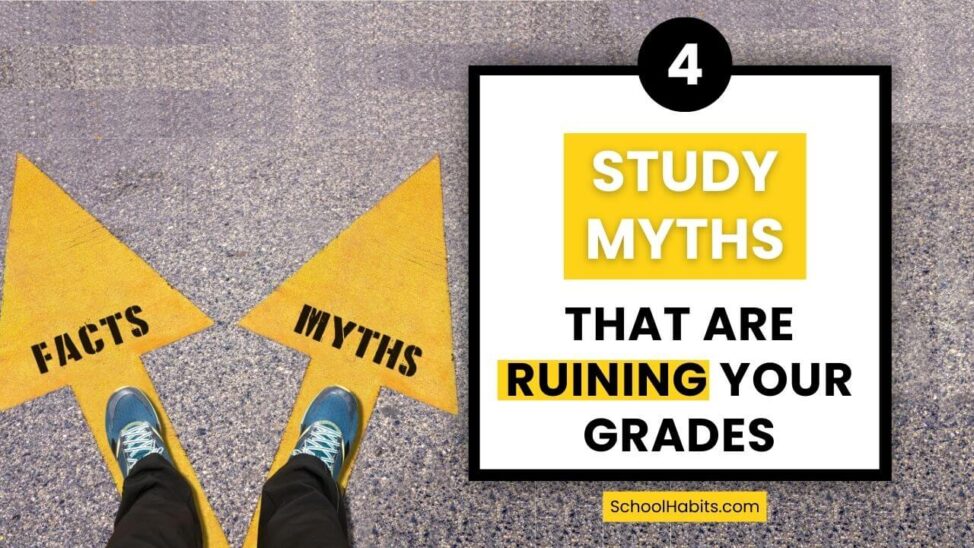By Katie Azevedo, M.Ed.
Part of my job as a study skills expert and executive functioning coach is to stay current on the research around learning. Once in a while, I come across bogus study advice that is not only funny, but that does more harm than good.
In this week’s blog post, I’m sharing three common study myths I want you to stop falling for. I was inspired to write this post after the positive feedback I got on my tutorial titled “How to Be a Good Student: 4 Common Myths About What It Really Takes.”
4 Common Study Myths That Are Ruining Your Grades
Believing any of these study myths will waste your time and tank your grades.
Common Study Myth #1: Studying More is Better
It’s a myth to believe that studying more or for longer hours is better. YouTube and social media are filled with “study with me” videos of students studying for five+ hours at a time, as if that’s something to strive for, but that study approach is nonsense.
Knowledge acquisition (learning) does take effort and time, although all-nighters and epic study sessions never pay off the way you think they do.
The best way to study is to map out reasonably long study sessions for multiple days leading up to an exam. Here is my full tutorial on how to use spaced repetition.
Below is a visual of using spaced repetition to map out study sessions for a basic high school or college test.
The image contains two different variations of spaced repetition in preparation for the same test. There are more variations than the ones I show here, but notice how no study session lasts longer than 60 minutes.


If you head to my spaced repetition tutorial after you’re done here, you will learn the science behind spaced repetition. That’s the true explanation as to why studying longer is a study myth. But in a nutshell, our brains need time in between study sessions to allow ourselves to “nearly forget” what we’re learning so that our next study session strengthens the neural networks in our brain as it attempts to remember information from the previous session.
The Truth:
Another reason why it’s a study myth to believe that studying more is better is that true knowledge acquisition happens when you use the RIGHT study methods. True knowledge acquisition does NOT happen when you study a lot using the WRONG study methods.
Although different study techniques work for different students, the most effective study methods utilize active recall. Many different study methods use active recall, including the ones I talk about in this episode of the Learn and Work Smarter Podcast.
What does not count as active recall study methods are rereading notes, rereading textbook chapters, or scrubbing through videos to review material. I’ve sadly seen so many students spend hours rereading their notes or textbooks, only to do poorly on their tests. This is a classic example of spending a lot of time on the wrong study methods and getting no results.
The solution is to use a combination of active recall study methods and a spaced repetition study schedule. This magic combination will enable you to learn your material more quickly, therefore reducing how much time you spend studying.
Common Study Myth #2: Grades Are More Important Than Anything
Don’t get me wrong: grades are important. But the mentality that grades are more important than anything else ironically causes you to get worse grades.
Hear me out. Students who believe that grades are more important than learning the material tend to opt for memorization rather than learning. Those are the students that look for shortcuts and hacks. And honestly, these are the students that are likely to fall for common study myths in the first place.
I dive deep into the difference between memorization and learning here, and I strongly encourage you to read that blog post afterward. But in a nutshell, the danger of memorization is that it fools you into thinking you know the material. But your ability to regurgitate something word for word has nothing to do with your ability to apply material to test questions.
Memorization is also temporary, and so it’s a waste of time if you need to use that information at a point further than 12 hours away.
Another reason why focusing on grades more than learning is a dangerous study myth is that it’s no secret there are ways to get credit or a good grade for simple assignments like classwork or homework.
And I do understand the appeal of finding shortcuts to get an easy A without really doing the work.
But this approach means that you’re not LEARNING the material. And this is a big deal!
Almost anyone can get an A on a simple homework or classwork assignment without really learning the material. But what happens during the exam? What happens when you have to write a paper on the material? You definitely won’t get the A because you never really knew what you were doing in the first place.
The Truth:
I say this all the time but I’ll say it again: Learning the material from the very beginning, by paying attention in class and doing your assignments for real, IS THE DARN SHORTCUT. If you’ve gotten this far with the mentality that shortcuts and hacks mean you’ve beat the system, oh how wrong you are.
If you learn the content for real, the grades will follow. Test? No problem, because you know the material. Essay? No problem, because you know the material. Pop quiz? No problem because you learned the material.
Common Study Myth #3: Learning Is Easy
It’s a harmful study myth to think learning things is easy. There’s nothing about learning that’s easy. Even if you like the material and find it relevant, the actual mental process of learning things is challenging for everyone.
The reason why this is a dangerous yet common study myth is that so many students fall for it because they want it to be true. We all want studying to feel good. We all want the satisfaction of knowing things. And we all want to avoid the discomfort of the reality that we don’t know things.
(Psst: Here are 3 study methods that are a total waste of time — head there when you’re done here.)
The Truth:
Hear me loud and clear: Studying is uncomfortable. If it’s not making you slightly uncomfortable, then you’re not doing it right.
Using active recall methods, which we talked about in study myth #1, is by nature an uncomfortable process. But our goal here is to do it anyway.
Uncomfortable things are nothing more than uncomfortable things. We don’t have to make them mean anything else.
If you are using ineffective passive study methods like rereading your notes and textbook, you’ll probably feel pretty good during your study sessions. You might even have study sessions with friends that are… dare I say it… fun. But this is where the danger lies. I’m going to repeat what I said earlier: if you’re not slightly uncomfortable while studying, you’re not studying right.
On the other hand, if you’re using active recall methods and spaced repetition, and you’re getting frustrated with yourself for not learning material as quickly as you want to, you’re doing it right! Stay in it. I argue that the first 75% of the study process is forgetting things over and over and over again… And then only the last 25% is when you begin to remember information between sessions. Don’t give up before you hit that 25%, which comes on the other side of discomfort.
Common Study Myth #4: Knowing Something for Homework Means You’ll Know It for The Test
The fourth and final common but dangerous study myth is thinking that knowing something while you do your homework means that you will know it when you’re tested on it.
Nothing could be further from the truth.
So many students I work with get confused when they can solve math problems or answer biology questions or label a diagram for classwork or homework, but are unable to do the same thing on their test.
The problem is that when we do our classwork and homework, we have access to all of our resources. If we get stuck on a question, we can Google it. If we forget how to do a math question, we can look at our math notes. This is exactly what we should do and it’s part of the learning process, but the learning process cannot stop there.
The Truth:
The only way you’ll know if you’re ready for a test is to test yourself before the test.
In this blog post, I dive into more detail and strategies about how to know if you’re really ready for a test. Please read that when you’re done here.
An offshoot of this common but dangerous study myth is when you “kind of” understand the material during your study sessions, and somehow convince yourself that you’ll “be fine” on the test.
When I’m working with students, I will often have them work through a process-based question that’s going to be on their test, something like math or science. They’ll get to a certain point in the process, get stuck, and then say, “But I’ll be fine on the test. I know how to do it.”
Ummmm… no. If you knew how to do it, you would do it now.
This comes back to the reality that humans don’t like to admit when they don’t know something. When there’s more work to be done. When they’re not quite there yet.
It’s much easier to tell ourselves that we know something when we don’t, than it is to admit we have more to go.
Final Notes About Common Study Myths
It is perfectly okay if you fall for some of these study myths. In fact, it’s perfectly okay if you’ve been believing these myths for your whole life. Social media and YouTube and pack mentality do a great job of making you believe things that aren’t true.
So let this be not a lesson about the past, but a lesson about the future. From this point forward you’re going to do things differently.
If you’ve been falling for any of these common study myths up until now, you’re going to stop believing them. You’re going to follow the TRUE study strategies that I shared here, and you’re going to do the work. (Because remember: Doing the work and learning the thing IS the shortcut.)
Related Resource: Is school feeling harder than it should? Here are 7 invisible traps that make even the “easy” parts of school feel hard.


